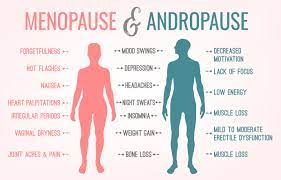Menopause is a natural biological process that marks the end of a woman’s reproductive years. It is defined as the permanent cessation of menstrual periods for 12 consecutive months, typically occurring between the ages of 45 and 55. While menopause is a natural part of aging, it can bring about a range of physical and emotional changes. In this article, we will explore the symptoms, causes, and management of menopause.
Symptoms of Menopause
The symptoms of menopause can vary widely between women, and may include:
- Hot flashes: A sudden feeling of warmth or heat that spreads over the body.
- Night sweats: Hot flashes that occur during sleep, often leading to disturbed sleep and insomnia.
- Vaginal dryness: Reduced vaginal lubrication and elasticity, which can cause discomfort and pain during sex.
- Mood changes: Anxiety, irritability, depression, and mood swings.
- Sleep disturbances: Difficulty falling or staying asleep.
- Urinary problems: Urinary tract infections, urinary incontinence, and increased urination frequency.
- Changes in sexual desire: A decrease in libido or interest in sex.
- Physical changes: Fatigue, weight gain, joint pain, and muscle stiffness.
Causes of Menopause
Menopause is caused by a decline in the production of hormones such as estrogen and progesterone by the ovaries. As women age, their ovaries produce less of these hormones, leading to changes in the menstrual cycle and ultimately the end of menstrual periods. Menopause can also be caused by certain medical treatments, such as chemotherapy or radiation therapy.
Management of Menopause
There are several strategies women can use to manage the symptoms of menopause. These include:
- Hormone replacement therapy (HRT): HRT involves taking estrogen and sometimes progesterone to help alleviate menopausal symptoms. It is typically prescribed for a short period of time and can have risks and benefits.
- Non-hormonal medications: Certain medications, such as antidepressants or blood pressure medication, can help manage specific symptoms such as hot flashes or mood changes.
- Lifestyle changes: Regular exercise, a healthy diet, and stress management techniques such as meditation or yoga can help manage menopausal symptoms.
- Vaginal moisturizers and lubricants: These products can help manage vaginal dryness and discomfort during sex.
- Support groups or counseling: Talking with others going through menopause can provide emotional support and help women navigate the physical and emotional changes of menopause.
Prevention of Menopause
Menopause is a natural part of aging and cannot be prevented. However, there are several steps women can take to help manage their menopausal symptoms and maintain their overall health. These include:
- Eating a balanced diet rich in calcium and vitamin D to maintain bone health.
- Regular exercise, which can help prevent weight gain, improve mood, and reduce the risk of osteoporosis.
- Avoiding smoking, which can increase the risk of cardiovascular disease and other health problems.
- Limiting alcohol and caffeine, which can exacerbate symptoms such as hot flashes and sleep disturbances.
Conclusion
Menopause is a natural biological process that marks the end of a woman’s reproductive years. While it can bring about a range of physical and emotional changes, there are several strategies women can use to manage their symptoms and maintain their overall health. These include hormone replacement therapy, non-hormonal medications, lifestyle changes, vaginal moisturizers and lubricants, and support groups or counseling. By taking proactive steps to manage their menopausal symptoms, women can navigate this transition with greater ease and maintain their overall well-being.

